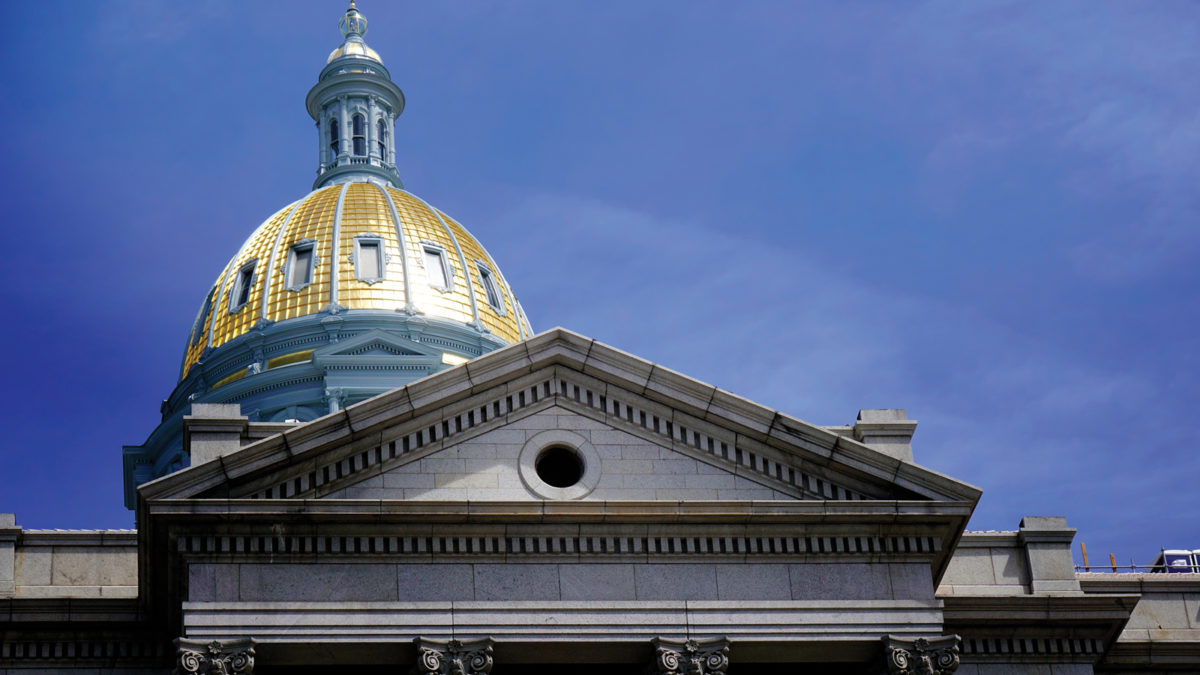
The CBA’s 2020 Legislative Session in Review
August / September 2020

This article provides an overview of the CBA’s legislative efforts during the Colorado General Assembly’s 2020 session.
The Colorado General Assembly adjourned on June 15 after an unprecedented and unpredictable year. The legislature put its work on hold for 10 weeks due to public health concerns, faced a staggering 20% hole in its general fund tax revenues, adopted numerous measures to respond to the COVID-19 pandemic, and reached bipartisan consensus on law enforcement reforms. The 2020 session was without parallel in recent history.
2020 Session Highlights
During the tumultuous 2020 session, the CBA actively worked on 27 legislative measures under consideration by the Colorado legislature. Considering that the legislature shortened its 120-day calendar by 36 days and largely could not fund new programs, the CBA experienced many successes with our key priorities. But we encountered some mixed results and roadblocks along the way that will require work in future legislative sessions.
Session Successes
- HB 20-1013: Specify Procedure Ratify Defective Corporate Actions. The CBA successfully proposed a statutory procedure for the ratification of defective corporate actions, which will continue to be governed by common law until the bill takes effect on September 14. The CBA was the main proponent of this bill, which Governor Polis signed on March 20.
- SB 20-093: Consumer and Employee Dispute Resolution Fairness. The CBA opposed this bill, which sought to modify significantly how arbitrations are conducted in Colorado and to place additional requirements on the practice. The bill was defeated in committee on June 4.
- HB 20-1200: Sunset Homeowners’ Association Information and Resource Center. The CBA successfully supported the five-year extension of the Homeowners’ Association Information and Resource Center within the Department of Regulatory Affairs. This bill originally proposed an alternative dispute resolution process to be housed within the department, but legislators removed the expanded role late in the session out of budget concerns. The CBA supported the extension of the office and expects the sponsors to revisit a dispute resolution mechanism during the 2021 session. The legislature adopted the bill on June 11, and Governor Polis signed it on June 30.
- HB 20-1096: Authorize Protected Series of Limited Liability Company. The CBA opposed efforts that would have allowed, under Colorado law, the creation of a protected series of a series limited liability company (series LLC). A series LLC is a type of LLC that, in addition to traditional vertical liability shields, provides horizontal liability shields across multiple “series,” each of which is theoretically protected from liabilities arising from the other series. Based on discussions with proponents and the sponsor, the CBA anticipates the need to address this matter in a future legislative session for series LLCs that currently operate in this state but are formed under the laws of another jurisdiction. The bill was defeated in committee on February 27.
Mixed Results and Continuing Efforts
The CBA met with mixed results on SB 20-096, which authorizes Colorado-licensed notaries to perform notarial acts remotely. Legislators introduced the bill early in the legislative session, but in the wake of the state’s response to the COVID-19 pandemic, the Secretary of State implemented emergency rules authorizing remote notarization on a temporary basis. The CBA provided critical guidance to the offices of both the Governor and the Secretary of State during the issuance of executive orders and the promulgation of the remote notary emergency rules. Adoption of SB 20-096 will largely codify the process currently allowed under the emergency rules. To prevent gaps, the Secretary of State is expected to continue following the current emergency rules on a temporary basis until final rules called for by the bill are adopted. While the CBA’s efforts to amend several parts of the bill were successful, we continue to have concerns about the bill’s shortcomings in privacy protections. The CBA and lawmakers committed to work on a privacy protection bill for introduction in a future legislative session. The legislature passed SB 20-096, and Governor Polis signed the bill on June 26.
The CBA fell short in our efforts to address the effects of the Colorado Supreme Court’s January 2020 opinion in In re Parental Responsibilities of W.C.1 The Court released the opinion after the legislature convened, so the CBA sought special permission to introduce a bill that would provide the trial court continuing jurisdiction during an appeal over parenting time, decision-making, child support, and maintenance. Unfortunately, timing was not our friend. While legislative leadership considered the CBA’s request, the legislature temporarily adjourned for 10 weeks due to the COVID-19 pandemic. When the legislature reconvened in late May, legislative leadership did not consider the proposal of sufficient urgency to be introduced during the limited days remaining in its 2020 session. The CBA will explore resubmitting the bill for the 2021 legislative session.
The Session’s Unprecedented Delay
The CBA’s 2020 legislative efforts were overshadowed by the extraordinary events of 2020. Due to the COVID-19 pandemic, the legislature paused its substantive work for much of the spring. In a typical year, the Colorado legislature wraps up its work by the first week of May. The year 2020 was anything but typical.
On March 11, Governor Polis declared a disaster emergency for Colorado due to the COVID-19 pandemic by signing EO D2020-003, which he has extended several times through the spring and into summer. Several days later, on March 14, the legislature temporarily adjourned out of concern for public health and challenges for legislators and the public to socially distance at the Capitol. The temporary adjournment set in motion a series of unprecedented actions for the legislature. When they adjourned, legislators were uncertain whether they could safely reconvene before their mandated adjournment date of May 6, or whether they were constitutionally authorized to declare a crisis and postpone their May 6 adjournment date to later in the year.
On its last day of business before temporary adjournment, the legislature invoked Joint Rule 44(g), adopted during the 2009 H1N1 pandemic, which allows for suspension of the legislature during a public health crisis. Because the rule had never been triggered, the legislature also formally requested an opinion from the Colorado Supreme Court as to whether the General Assembly may constitutionally suspend its 120-day calendar per the joint legislative rule.
The Court accepted the legislature’s request for interrogatories, and legislators filed their briefs with the Court, splitting along party lines. On April 1, the Colorado Supreme Court issued a 4–3 decision stating that Joint Rule 44(g) is constitutional and the General Assembly’s 120-day session need not run consecutively.2 The legislature reconvened on May 26, meeting for a fast-paced three-week session that adjourned on June 15.
During the legislature’s temporary adjournment, the CBA continued its advocacy with state decision-makers, responding to the effects of the COVID-19 pandemic and associated economic shutdown. As discussed above, the CBA played a pivotal role in the adoption of emergency remote notary rules. The CBA also successfully advocated for remote witnessing rules implemented by the judiciary, ensured that attorneys were deemed “essential” workers by the Department of Public Health and Environment’s March 25 Public Health Order, and created and implemented a COVID-19 addendum for the standard real estate contract form.
Budget Shortfalls, Law Enforcement Reform, and the Pandemic Response
When legislators reconvened, they immediately faced multiple crises in rapid succession: a significant decline in state tax revenues, calls for law enforcement reform, the state response to the COVID-19 pandemic, and Coloradans facing personal economic hardships. To reduce the potential spread of COVID-19 during the remaining session, lawmakers voluntarily reduced the number of days they convened and reprioritized bills left on their calendar, quickly defeating over 300 bills in their first days back at work to make room on the calendar for new legislative priorities.
One of the most significant issues the legislature faced was the unprecedented and dramatic plunge in state revenues for the fiscal year starting July 1—over $3 billion of the $12 billion state general fund. The Joint Budget Committee (JBC) began meeting in early May to prepare the budget to present to the legislature. Budget cuts spared no state department or agency, and the legislature adopted the JBC’s proposed budget largely unamended.
State lawmakers balanced the state budget through a series of dramatic choices by:
- reducing by 1% certain medical reimbursement rates, largely affecting Medicaid providers;
- cutting $550 million from K–12 education;
- cutting state support to higher education by 58%, and restricting increases in tuition to 3%;
- cutting all state personnel costs by 5%, across the board;
- suspending the Senior Homestead Property Tax exemption;
- diverting $50 million earmarked for transportation projects;
- eliminating a $225 million payment to the state employee retirement system; and
- transferring millions of dollars from multiple cash funds to shore up the general fund, including marijuana tax revenues, oil and gas severance tax revenues, and funds earmarked for K–12 school construction.
With less than two weeks remaining in the session, legislators took action to address law enforcement abuses, spurred by shocking images of recent civilian deaths at the hands of law enforcement. Buoyed by overwhelming bipartisan support (32–1 in the Senate and 52–13 in the House of Representatives), Governor Polis signed SB 20-217 into law on June 19. The CBA publicly supported the bill but encouraged the legislature to address issues such as inapplicable statutory immunities referenced in the bill and protected health information. The CBA anticipates that lawmakers will continue to refine the statute in future legislative sessions. The new statute creates statewide standards on the use of body-worn cameras, makes mandatory the revocation of peace officer certification in certain circumstances, removes qualified immunity for officers, requires law enforcement agencies to indemnify officers acting in good faith, limits the acceptable use of force by law enforcement, and requires the collection of statewide data.
Finally, to address the COVID-19 pandemic and related economic downturn, the legislature passed an extensive package of bills. For more information on the following legislation, please visit the Colorado General Assembly website, https://leg.colorado.gov.
- SB 20-205: Sick Leave for Employees. This bill requires employers to provide employees who normally work 40 or more hours a week with at least 80 hours of additional paid sick leave during a public health emergency. At other times, employers are to provide one hour of paid sick leave for every 30 hours worked, up to a maximum of 48 hours per year for all employees. Governor Polis signed the bill on July 14.
- SB 20-207: Unemployment Insurance. This bill amends the Colorado Employment Security Act to address public health emergencies, increase benefit payments, and increase “chargeable wages.” The bill also requires a study of unemployment assistance. Governor Polis signed the bill on July 14.
- SB 20-211: Limitations on Extraordinary Collection Actions. This bill allows debtors experiencing a financial hardship related to the COVID-19 pandemic to suspend debt collection by their creditors through November 1, 2020. Governor Polis signed the bill on June 29.
- SB 20-222: CARES Act Money Small Business Grant Program. Financed with $20 million in federal CARES Act funding, this bill creates the Small Business COVID-19 grant program in the Colorado Office of Economic Development and International Trade to assist small businesses facing COVID-19 pandemic economic hardship. Governor Polis signed the bill on June 23.
- HB 20-1410: COVID-19-Related Housing Assistance. Financed with $20 million in federal CARES Act funding, this bill provides additional funding to the Housing Development Grant Fund in the Division of Housing. The division may use this money to provide rental assistance, residential mortgage assistance, and guidance on how to access additional housing services to those impacted by the COVID-19 pandemic. The CBA supported HB 20-1410. Governor Polis signed the bill on June 22.
- HB 20-1411: COVID-19 Funds Allocation for Behavioral Health. Financed with $20 million in federal CARES Act funding, this bill allocates $15 million in CARES Act funding to state behavioral health programs. Governor Polis signed the bill on June 22.
- HB 20-1412: COVID-19 Utility Bill Payment-Related Assistance. Financed with $10 million in federal CARES Act funding, this bill directs the Colorado Energy Office to provide direct utility bill payment assistance to households facing economic hardship due to the COVID-19 pandemic. Governor Polis signed the bill on June 22.
- HB 20-1413: Small Business Recovery Loan Program Premium Tax Credits. This bill creates the Small Business Recovery Loan Program within the Colorado Department of the Treasury and allows the Treasurer to issue insurance premium tax credits to insurance companies that incur premium tax liability. The face value of the tax credits may not exceed $68 million through June 2022. Governor Polis signed the bill on June 23.
- HB 20-1414: Price Gouge Amid Disaster Deceptive Trade Practice. This bill creates a deceptive trade practice for price gouging during a disaster period, enforceable by the Attorney General or a district attorney’s office with jurisdiction where the act occurred. Governor Polis signed the bill on July 14.
- HB 20-1415: Whistleblower Protection Public Health Emergencies. This bill prohibits employers (including those that use independent contractors) from discriminating, retaliating, or taking adverse action against any worker who raises concerns about workplace health and safety practices or who voluntarily wears personal protective equipment. Governor Polis signed the bill on July 11.
- HB 20-1425: Hospital Patient Visitation Rights During COVID-19. This bill entitles a patient receiving inpatient care at a hospital to designate one individual with visitation privileges. Governor Polis signed the bill on June 29.
Other Legislation of Note
In addition to the bills discussed above, the CBA worked with lawmakers and stakeholders on the bills listed in the accompanying chart. For complete information on these and any other bills that were introduced, visit the Colorado General Assembly website.
Conclusion
In spite of the unprecedented events that impacted the Colorado General Assembly’s 2020 legislative session, the legislature managed to conduct its business. While it was unable to consider many bills, the legislature passed some significant measures, including those required to respond to the national crises. The CBA worked throughout the session to support these efforts, and while it achieved success, unfinished business remains for future sessions.
Related Topics
Notes
1. In re Parental Responsibilities of W.C., 2020 CO 2.
2. In re Interrogatory on House Joint Resolution 20-1006, 2020 CO 23.
Other Legislation of Note
| Bill Number |
Bill Title |
CBA Position |
Final Action |
Notes |
| Proposed | Concerning the Exemption of COVID-19 Economic Stimulus Payments from Execution, Levy, Attachment, Offset, Garnishment, or Other Legal Process | Support | Not introduced | CBA proposed this legislation, but legislative leadership introduced SB 20-211, a more aggressive debtor protection bill |
| HB 20-1009 | Suppressing Court Records of Eviction Proceedings | Amend | Governor signed March 20 | CBA unsuccessfully requested amendment to limit court record suppression to residential tenants only |
| HB 20-1062 | Colorado Student Free Expression Law | Monitor | Governor signed March 24 | |
| HB 20-1079 | Juveniles on Colorado Sex Offender Registry | Support | Deemed lost, June 16, House Appropriations | Required more than $300,000 in general fund expenditures |
| HB 20-1106 | Limit Public Inspection of Internal Affairs Report | Oppose | Defeated, February 1, House Judiciary | |
| HB 20-1263 | Eliminate Sub-Minimum Wage Employment | Support | Deemed lost, June 16, House Appropriations | Required over $150,000 in general fund expenditures |
| HB 20-1270 | One-Parent Consent for Behavioral Health Services | Amend | Deemed lost, May 28, Senate floor | CBA was successful in amending to address concerns |
| HB 20-1291 | Uniform Collaborative Law Act | Amend | Defeated, May 26, Senate Judiciary | Defeated to clear the legislative calendar in the final weeks of session |
| HB 20-1292 | Uniform Parentage Act | Oppose | Defeated, March 12, House Judiciary | |
| HB 20-1307 | Gay Panic or Transgender Panic Defense | Support | Defeated, May 26, Senate Judiciary | Bill reintroduced as SB 20-221 |
| HB 20-1333 | Homeowners’ Association Transparency, Responsibility, Competency | Oppose | Defeated, May 27, House Transportation and Local Government | Defeated to clear the legislative calendar in the final weeks of session |
| SB 20-083 | Prohibit Courthouse Civil Arrest | Support | Governor signed March 23 | |
| SB 20-100 | Repeal of the Death Penalty | Support | Governor signed March 23 | |
| SB 20-108 | Concerning a Prohibition on a Landlord Engaging in Certain Activities Related to a Tenant’s Citizenship Status | Support | Defeated, May 27, House Business | Reintroduced as SB 20-224; CBA worked with sponsors to amend, then support |
| SB 20-129 | Protection of Individuals Subject to a Fiduciary | Support | Governor signed July 10 | CBA opposed introduced version, worked with sponsors to successfully amend |
| SB 20-1659 | Honoring Carrie Ann Lucas | Support | Defeated, May 27, House Public Health | Defeated to clear the legislative calendar in the final weeks of session |
| SB 20-221 | Concerning Banning the Use of a Panic Defense Unless a Party can Show Its Relevance to the Court | Support | Governor signed July 13 | See HB 20-1307 |
| SB 20-224 | Concerning a Prohibition on a Landlord Engaging in Certain Activities Related to a Tenant’s Citizenship Status | None | Governor signed June 30 | See SB 20-108; bill introduced and passed in three days; CBA did not have time to consider |


